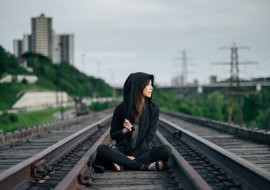
Covid 19 blog #8: a time of loss and a time of adaption-to what?
“do not go gently into that good night/old age should burn and rage at close of day/rage, rage against the dying of the light” -Dylan Thomas
Counselling clients (and doing a fair bit of self-reflection on my own experience) has led me to agree with many that the time we are going through now is most akin to a time of loss. This, of course, provokes in most of us a range of feelings that resemble grief in its many forms. It was Elizabeth Kubler-Ross[1] who categorised these into what has become known as the loss cycle, the passage of grief and mourning that seems to have five distinct phases to it: denial, anger, bargaining, depression and acceptance or, as it is sometimes known, adaptation[2].
What has always struck me is that the first three stages-denial, anger and bargaining-have a certain energy to them, whereas depression is flat and energyless, and since I picture this cycle like a ski slope, the passage to acceptance is uphill and can be hard work indeed. We have a tendency to re-visit (recycle?) parts of these stages, sometimes like a pinball, yet feedback from clients who am I counselling right now (April 2020) are reporting lowness, flatness, loss of motivation, a quite specific sense of doubt, that nothing positive seems to be happening, feelings of discouragement; a sort of loss within the loss, so to speak.
The fight or flight that propelled the initial three stages may be being replaced by a stage of immobilisation. This is a very difficult stage if we are all going to get through it; a depressed nation will find it hard to get back in its stride-whereas a nation in denial, anger, or bargaining, these energies can be harnessed, accommodated and met: a freeze is going to take a long thaw to release.
Here are some of the changes (losses) we have been encouraged to adapt to:
- feeling constantly no longer safe and under threat
- feeling at the mercy of an invisible enemy that can infect me and my loved ones at any moment
- mainstream media (e.g. BBC, Sky, Channel 4, ITV) seemingly invested in keeping me in a constant state of fear to retain their ratings
- having to be locked inside the house without the possibility to move or expand, to fully decompress
- being asked paradoxically not to do things, the opposite of the stress of “so many things to do”
- being asked not to shop, not to work, not to socialise, not to eat breakfast/grab a cup of coffee at the coffee house in the morning
- being asked to keep 2 metres (6 feet) distance
- being asked not to do handshakes, hugs, kisses with people
- being asked not to touch (people, doorknobs etc) -which barricades off a fundamental human need[3] -will some experience touch deprivation?
- groups being suddenly polarised between those who are “pure” i.e. who always obey the law, and those who are “not okay” (i.e. unpure) who are perceived as flouting the law and therefore are akin to dirty, disease spreaders
- the infantilisation of my decision making
- clustering older age groups together as unfit and inessential; in essence institutional agism
- being asked to be okay with my work (which I might have done with skill and passion for 40 years) now being regarded as non-essential
- now being part of a hastily formed, fear driven narrative and orthodoxy that has become shameful and disgusting (note the contagion metaphor) to challenge
And so, the lockdown continues, yet recent studies post SARS (2009[4]) suggest that prolonged quarantine actually increases PTSD; studies show in general psychological symptoms like emotional disorders, depression, stress, mood disorders, irritability, insomnia and signals of post-traumatic stress might powerfully increase due to lockdown itself.
What else has changed? Time spent on social media has doubled[5], there has been a transfer and legitimisation from living a real life to now living a Zoom based virtual life. We are besieged on TV/radio with instructions on digitally connecting. My inbox/social media has never been fuller with businesses encouraging me to take part in “free” webinars, advice, online video expertise, trainings. Young people are continuing their studies on line and children are playing there as well; yet the risk of being hyperconnected, which can in turn become quickly addictive, pathological and is hugely difficult to pull out of is not addressed fully; in fact, hardly at all.
We are at risk of online gambling increasing, food disorders intensifying (sales of flour have skyrocketed, which means a huge increase in cake intake), suicidality climbing due to loneliness and mounting partner/child abuse[6].
This is, in all probability, the tip of the iceberg.
And this is, at the time of writing, less than 40 days in lockdown. This is a hell of an ask for any nation.
At this time of writing, there is something else which I feared we might have lost, but whose green shoots may be reappearing. In the Sunday Times letters column (26/04/20) a woman writes simply “I do not consent to a year of lockdown for over 70s. I will not do it. And I bet I’m not the only one”
This is not belligerence or ego, this is the spirit of dissent, of scepticism, of not taking things at face value, this is the great British characteristic of saying “prove it to me”, of questioning any form of blind obedience, of staying curious to the point of insurrection; creating a heterodoxy of thought, Galilean in its non-consensus. (Incidentally, if you hear the words “scientific consensus, reach for your gun; science does not have such a thing as consensus-you are being fed a lie).
It might be notable that it appears so far to be those in the over 50s generation (and it’s interesting that some-which some? -have called Covid 19 the “Boomer Remover”) seem to be more vocal about this loss of dissent than those younger. Why might that be? Could it be because those over 50 are smarter? I would think not. It could be, though, that those over 50 have literally been lied to, disregarded, shafted, conned, ripped off and shit on so many times in their lives, by governments, scientists, statutory bodies; bullshitted by committees and corporations with their countless false promises and mediaspawned lies that they have a greater tenancy towards disbelieving and doubting. When you have been screwed over and over so many times by the folk who take your taxes it makes you a bit cynical. And that might be a healthy thing. Anger has an energy.
Or, it could be, that the older you are, the more you have to lose: your life. A year indoors if you are 80 could well be the last year of your life; a year spent indoors if you are 20 is less likely to be. At an older age, you are more likely to ask “do I want to live long, or well? Do I want to walk out and feel the sun on my face?”
A newly formed orthodoxy might say: “but people might die, the disease could spread”. And of course, they might be right, but the remark places us in a tight and morally infantile psychological bind, the only resolution to which is to lean into risk and uncertainty itself with mindful awareness. The (critical) parental injunction that this is embedded into only serves to further seduce and reduce us. We are not children and we can take intelligent risks.
Many of us have been doing for over 50 years….
The sceptic might, of course be wrong; dissent does not arrive with a guarantee of being informed or correct. Yet this might matter less than the freedom to be sceptical; the freedom to dissent. We cannot lose this, this great British characteristic. It is allied to that great British attribute of not taking ourselves or situations too seriously, to satirising all sacred cows; this was the dissent that took our freedoms so seriously that we rebelled at the thought of ID cards, yet we have gone into house arrest willingly, clapping with approval.
Decades ago, the French philosopher Foucault[7] pointed out that for every dominant discourse there is a subjugated one that is all but suppressed by fear, by force, by blind and unproven consensus. The dominant discourse holds power itself, to the extent that we identify with it and make it our new orthodoxy. It can feel like safety, it is more akin to safteyism.[8] A docile complacency, a fragility then develops and we fit our experiences to suit the dominant discourse of the time. This is the very opposite of what Esther Perel calls Eros[9], living. Mourning becomes us.
In spite of what we might think, this is the very reverse of what a working nation needs. It needs dissent, challenge, discomfort and disagreement, it needs friction and creative antifragility[10], pushback and scepticism to establish the new and become innovative, it needs risk and it needs play and it needs Eros itself.
How do we maintain our antifragility[11]? How do we connect with our insightful rage and wise Eros? What light might be dying, what subjugated discourse might we be in danger of losing as we fall more deeply into our mourning?
Also see
https://www.spiked-online.com/2020/04/22/there-is-no-empirical-evidence-for-these-lockdowns/
and for comparative lockdown figures https://www.worldometers.info/coronavirus/#countries
[1] https://en.wikipedia.org/wiki/K%C3%BCbler-Ross_model
[2] In the context now: what might we be really adapting to and when does the merely adaptive become maladaptive?
[3] https://www.psychologytoday.com/gb/blog/the-fifth-vital-sign/201805/humans-wired-touch
[4] https://www.ncbi.nlm.nih.gov/pmc/articles/PMC3780353/
[5] https://www.businesstoday.in/technology/news/coronavirus-87-percent-increase-in-social-media-usage-amid-lockdown-indians-spend-4-hours-on-facebook-whatsapp/story/399571.html and https://www.socialmediatoday.com/news/people-are-spending-20-more-time-in-apps-during-the-covid-19-lockdowns-re/575403/
[6] https://www.theguardian.com/society/2020/apr/24/mental-health-coronavirus-lockdown-helplines
[7] https://www.powercube.net/other-forms-of-power/foucault-power-is-everywhere/
[8] https://quillette.com/2018/09/02/is-safetyism-destroying-a-generation/
[9] https://eliseballard.com/2013/02/13/an-epiphany-of-eros-esther-perels-interview-with-elise-ballard/





Write a Comment